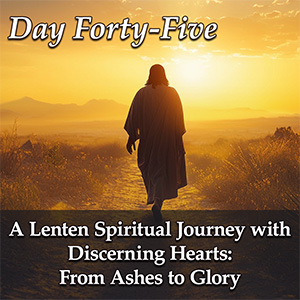Podcast: Play in new window | Download (Duration: 7:51 — 5.5MB) | Embed
Subscribe: Apple Podcasts | Spotify | Amazon Music | Android | Pandora | iHeartRadio | JioSaavn | Podchaser | Gaana | Podcast Index | Email | TuneIn | Deezer | Anghami | RSS | More
A Lenten Spiritual Journey with Discerning Hearts: From Ashes to Glory – Discerning Hearts Podcast
Day 45: The Cross Stands While the World Turns
Scripture Reading: (Jerusalem Bible)
John 19:25–30
Near the cross of Jesus stood his mother and his mother’s sister, Mary the wife of Clopas, and Mary of Magdala.
Seeing his mother and the disciple he loved standing near her, Jesus said to his mother, “Woman, this is your son.” Then to the disciple he said, “This is your mother.”
And from that moment the disciple made a place for her in his home.
After this, Jesus knew that everything had now been completed, and to fulfill the scripture perfectly he said: “I am thirsty.”
A jar full of vinegar stood there, so putting a sponge soaked in vinegar on a hyssop stick, they held it up to his mouth.
After Jesus had taken the vinegar he said, “It is accomplished.”
And bowing his head he gave up his spirit.
Reflection:
Good Friday silences the world. It stops the liturgy. It draws us back to the place where everything was lost—and everything was given.
There is no Mass today. No consecration. The tabernacle stands open, the sanctuary bare. And yet this is the most sacred of days. Because today, the sacrifice is not repeated. It is remembered. Entered into. Offered.
We are not watching someone else’s pain. This is for you. This is for your healing. And this is where you are invited to respond—not with words, but with your life.
The Catechism says:
“By His passion and death on the Cross, Christ has given a new meaning to suffering: it can henceforth configure us to Him and unite us with His redemptive Passion.”
— CCC 1505
So what cross are you carrying?
It might be loud—grief, illness, loss. Or it might be hidden—loneliness, fear, the ache of unfulfilled hopes. Perhaps it’s the weight of another’s suffering, or a prayer that remains unanswered.
Christ is not asking you to deny your cross. He is asking you to bring it to His.
To lay it down beside His wounds. To say with Him, “Father, into Your hands…”
This is the mystery St. John Paul II spoke of when he wrote:
“Each man, in his suffering, can also become a sharer in the redemptive suffering of Christ.”
— Salvifici Doloris, §19
And Evagrius Ponticus echoed that when he wrote:
“Do not avoid grief. Run toward the Cross, for there Christ waits for you, not to condemn, but to raise you up.”
— Praktikos, §47 (adapted translation)
Mary stood at the Cross. She did not shield herself from the pain. She did not speak. She simply stayed. And in that silent offering, her motherhood was widened to include every soul. She is yours now.
John stayed too. He stayed when others fled. Not because he understood—but because he loved.
You may not understand. That’s okay.
You may not feel strong. That’s okay.
You may not have answers. You don’t need them.
Let your presence be your prayer.
Let your own cross—whatever it is—become part of the offering. That is not poetic imagery. It is a theological and mystical reality. In Christ, suffering is not wasted. It is transformed.
As Pope Benedict XVI once said:
“The Cross is love in its most radical form.”
— Way of the Cross at the Colosseum, Good Friday 2005
Let that love hold you now.
Reflection Questions:
1.What cross am I carrying right now?
2. Have I consciously offered it to Christ—not just to endure it, but to unite it with His?
3. Where in my life is Jesus inviting me to stop running and simply stay with Him?
Closing Prayer:
Jesus,
You entered into death so I would never be alone in mine.
You saw my sorrow and took it into Your own heart.
You embraced the Cross—and now invite me to do the same.
Today, I lay down my resistance.
I unite my cross with Yours—not with fear,
but with trust.
Not with resignation, but with hope.
Let my wounds be touched by Your wounds.
Let my suffering become a prayer.
Let my love remain at the foot of the Cross—
even in silence.
Amen.
This reflection is written by Kris McGregor of Discerning Hearts®. The Scripture passage is taken from the Jerusalem Bible (1966 edition), used with permission. No unauthorized use or reproduction is permitted without prior written consent.

